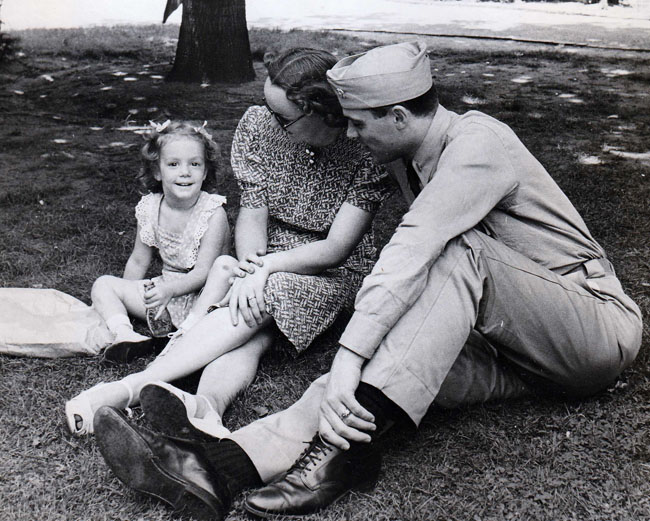It’s hard not to follow the news all day, every day, as this Russia-Ukraine war continues to grow. It is half a world away, yet every movement and bombing is broadcast across news sites and social media as it happens, like a horrible action movie coming to life, a disaster we can’t stop watching.
We have grown to expect to be informed within minutes now about everything. The “breaking news” flashing across the bottom banner doesn’t catch our eyes anymore, it’s constantly there, a fire hose of information, some of it true, some of it not, filling our minds to the point of overload.
In the basement of our house, locked in a fireproof box, is a stack of letters, most of them written by my maternal grandmother, who was 33 when my grandfather enlisted as an officer in the Navy in 1943 and was sent overseas to be a Dutch interpreter in the sub-basement of a department store in London. Their only child at the time, my mother, was 3.
I pulled them out of the box today to flip through them, looking for the pieces of news that I remembered reading, buried between the stories about the adorable things my mother was saying and doing and what the family and neighbors were up to — the kind of news soldiers would want to hear from home.
Almost eight decades have gone by since she wrote these letters in her elementary school teacher cursive. In many of them, she is begging my grandfather not to take any risks beyond what is required of his duty and come safely back home to them, sharing stories about a neighbor’s son who took a joy ride in a plane that later crashed, or a soldier who was killed trying to save a young girl’s dog.
Some of the letters have snippets of news she’s heard on the radio or from a family member or neighbor: “They say Hitler sounded like a decrepit old man on the radio today in his anniversary speech. Why don’t they bomb his mountaintop retreat?”
“The news sounds good as far as Russia is concerned — Mamma says if Russia can beat the dickens out of Germany, we may not have to have the invasion, as Russia has promised not to make a separate peace. So here’s hoping.”
“The news seems good — heard today that Churchill said the war in Europe might be over this summer. Hope he’s right! Wouldn’t it be wonderful!! I’m dreaming already, but I hope it comes true. Darling, won’t it be wonderful to live again.”
I can only imagine what a gift it was to receive a letter from my grandfather. She mentions them in her letters back, talking about getting two letters from him one day or a cable arriving to say he was okay. She comforts herself when updates don’t come, as she knows it takes a long time to get a letter across the ocean and he’s very busy fighting a war.
I wonder if it would have been a gift or a curse to have the news cycle we have today during World War II. Would my grandmother have spent every waking minute scrolling through her phone looking for the latest updates and following all the horrors of the war in real-time?
When I read through these letters, it sinks in that I have the luxury of knowing, for my family, this story has a happy ending. My grandfather returned home safely. My uncle was born the following year. There are grandchildren and great-grandchildren that wouldn’t be here if it had ended differently. But when my grandmother was writing them, she had no idea of what the next day would bring. And I think of the people of Ukraine who are living that way now, trying to figure out what the next day or even the next hour will bring. How will their story end?

